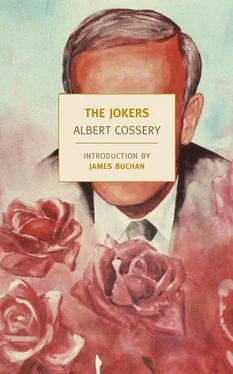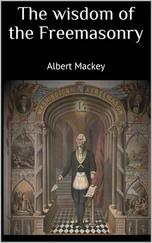Khaled Omar waved away a fly that had landed on the plate of loukoums and gave Heykal a look full of unspoken expectation. Why was his companion so silent? Why was he pretending to be so interested in what was going on in the street? Was he having second thoughts? Khaled Omar had long imagined this meeting, and he’d wondered whether Heykal would ask for his help right off. Heykal’s silence made him think he was hesitating to reveal his plans. This lack of confidence pained Omar. Hadn’t he just put all his earthly goods at Heykal’s disposal? The young man’s visible coldness, the elegance of his manners, his wary sarcastic smile — none of this displeased Omar. They were the signs of an aristocratic mind. No, Khaled Omar admired Heykal without reservation. If only he’d deign to take his fortune and accept his devotion.
“Thank you for your generosity,” said Heykal. “I will definitely need your help. But it won’t cost a fortune. Much less.”
“Whatever it is, give me your orders. I’m at your service.”
Heykal crossed his legs and let his gaze stray over the passing crowd once more; then he turned to Khaled Omar and said:
“Well, I’m sure I don’t need to tell you that the horror and stupidity of the current governor are completely beyond the pale.”
“I know, and I also know that he’s supported by a revolting clique of newspaper editors who can’t stop singing his praises.”
“That’s not a bad thing. On the contrary: it’ll make our task easier.”
“How?”
“Very simple,” said Heykal. “We’re going to jump on the bandwagon. We, too, will sing the praises of our odious governor. We’ll outdo them in their idiocy.”
“Karim told me that the papers have stopped publishing your enthusiastic letters to the editor. Well, it was a magnificent idea! I want to congratulate you for it.”
“That’s all over. Now we’re going to inaugurate an unprecedented campaign of subversive propaganda, the likes of which no secret police in the world has ever seen. For starters, I’ll print posters featuring the governor’s portrait with some words in his praise. The text will be so ridiculously laudatory, even the most naive citizens will laugh. With the help of some friends, we’re going to put them up on every wall in the city. Do you understand the impact this will have?”
“Of course. Everyone in the city will think the governor had the posters printed to bolster his image.”
“And why not! Has anyone ever known revolutionaries to attack a government with praise? Another thing: the governor himself will assume it’s the work of some well-meaning supporters. He’ll be flattered — that’s for sure. He’s too stupid to get it right away. But even if he did understand, it would be hard for him to take action against us. We’ll go on soft-soaping him indefinitely — and what’s the risk? They won’t dare charge us with praising the governor too much — although I’ll happily praise him in front of any tribunal. But it won’t come to that.”
“Your words fulfill my every hope!” said Khaled Omar. “By Allah, I don’t know what to say!”
“And that’s not all,” Heykal went on. “These posters are only the beginning. I have other ideas. In a word, we’re going to make the governor infamous across the country. He’ll become such a laughingstock that the government will have to strip him of power.”
Khaled Omar was wriggling in his seat, ever more captivated by his companion’s diabolical perversity. And yet there was an important flaw in Heykal’s logic. To plot the destruction of a man as entertaining as the governor: Wouldn’t that work against their common desire? The thought silenced him momentarily.
“Let me ask you: Do you really want him to disappear?”
“To tell the truth, no. Where will we find a buffoon to match him? But in the end, unfortunately, we’ll be forced to give him up. There’ll be no choice.”
“I’m getting the feeling,” said Khaled Omar, “that I’m finally going to have some real fun.”
A young goddess sailed toward the terrace, her breasts bobbing in her blouse like a ship on the high seas. Then, like a fleeting vision of debauchery, she was gone, leaving innumerable passions stranded in her wake. Right away the customers at a neighboring table started analyzing her beauty like real connoisseurs, and when they got to her rear end, it was as if they’d discovered the fundamental truth of the universe. A vigorous debate rich in imagery ensued, and no insult was spared when any disagreement arose in the course of their critique, which extended to the most intimate details of the unknown young woman’s body.
“Women,” said Heykal. “Aren’t they enough for you?”
“I love women,” responded Khaled Omar. “But they’re nothing compared with the delights you propose.”
“Are you married?”
“Of course. I’m a respectable businessman! But I should explain: It’s not always the same model. I’m not one of those rich imbeciles who changes his car each year while keeping the same wife. Me, I change wives each year — and I don’t even own a car.”
“I’m happy for you,” said Heykal.
“Sometimes I get rid of them even quicker. Women age faster than cars, believe me.”
After a pause, he began again.
“Let’s get back to business. What do you need from me?”
“What I need,” said Heykal, “shouldn’t be very difficult to find for a man with your resources. First I need a printing press, then a private place to do our work. Can you provide that?”
“Anything you wish. You’ll have the printing press in two or three days at the latest. Isn’t there anything else I can do?”
“That’s all for now. Thank you. I’ll take care of the rest.”
“I assume you’ll write the text for the poster?”
“No, not me. I’m going to ask one of my friends to do it. A schoolmaster named Urfy. Maybe you know him.”
“I know him very well. I’m one of his students; I’m going to him to learn to read.”
“You’re going to Urfy’s school!” exclaimed Heykal with genuine admiration. “My word! You’re a remarkable man. Why do you want to learn to read?”
The businessman was tired of seeing Karim and his other literate friends laughing over articles in the papers. It demoralized him to feel so outside the loop. He had to beg them to read passages aloud. Once he’d been clued in, he could laugh too — even louder than the others — but this delayed satisfaction was tinged with bitterness. To end his dependency, he’d decided to learn to read; he wanted to be able to keep up with the delicious depravity of the ruling party all on his own.
“I wish I could really savor their lies. It’s a pleasure I’m longing to experience. Unfortunately, I’m not making much progress. I’m a lousy student.”
“Do you go regularly?”
“Oh, no! Only from time to time. I like Urfy a lot. Did you know that his mother’s gone mad?”
“Yes, I knew that,” said Heykal. “A few months ago she fell into a state of nervous prostration, a kind of gentle derangement. It could be much worse.”
“Still, she’s become a burden. He can’t look after her and also attend to his students. Before she fell apart, she helped at the school; she was an educated woman. Believe me, our friend’s situation is tragic, even though he won’t admit it. Many times I’ve offered to pay for her care in a residential clinic that specializes in her kind of madness, but he always refuses. I’m afraid to go on insisting — I don’t want to hurt his feelings. It’s a delicate business. Couldn’t you speak to him about it? With all my heart I want to help him, and I’m sure he’ll listen to you.”
Heykal had turned thoughtful. He’d known Urfy for a long time and knew all about the love and tenderness the schoolmaster felt for his mother. However crazy she got, he’d want to keep her close.
Читать дальше












